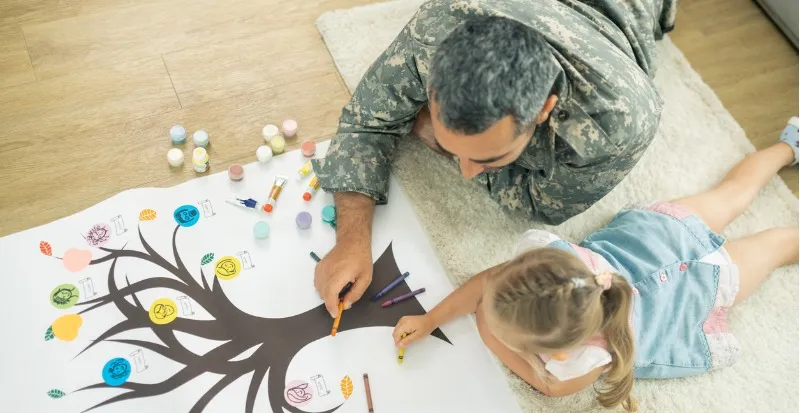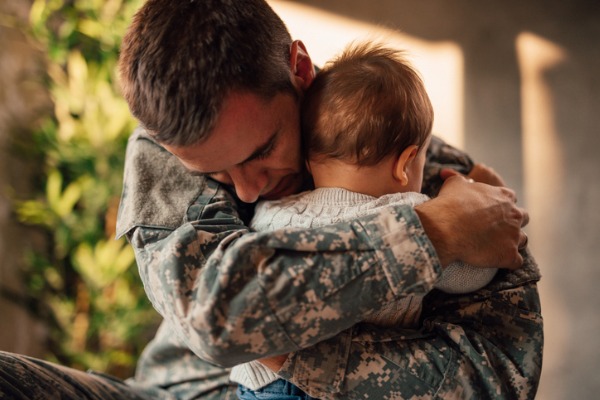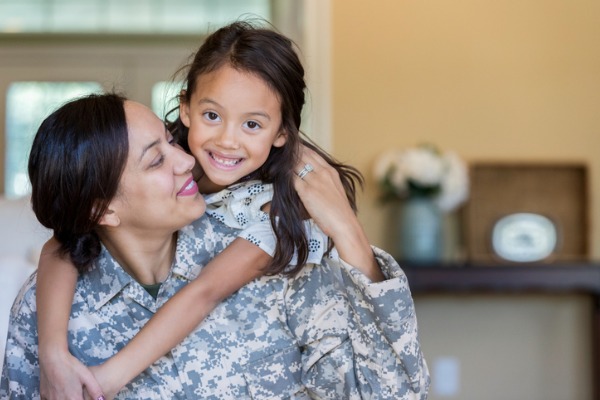Co-Parenting and the Military
Separated or divorced military couples must develop parenting plans that include caring for and supporting their children in the event of change of station, deployment, military exercises, and more.
- 3 min read
- custody
- divorce
- family law

Like all separated or divorced parents, couples who serve in the military must create parenting plans that outline how they will share time and care for their children. Separated or divorced military couples must develop parenting plans that include caring for and supporting their children through many scenarios that non-military families do not have to consider. Service members are often called away unexpectedly for reasons such as:
- Change of station moves
- Overseas deployments
- Stateside transfers far away from the children
- Unit training exercises
- Temporary duty stations
- Field duty
- Military exercises
Parenting plans
For military families, parenting plans need to include clear guidelines for how parents will maintain contact with their children when they are away. Of course, not all deployments or trainings are in areas that have easy or accessible communication. Parenting plans for co-parents in the military need to include:
- What happens to the visitation schedule when a parent is deployed or in training.
- Specifics on how the military parent will receive updates on matters concerning the children.
- Guidelines on what happens if a military parent receives orders to change duty stations.
- What happens when the military parent returns from a deployment or training.

Custody arrangements
Generally, in joint custody situations where only one parent is in the military, the civilian parent takes care of the children when the service member is on duty.
When the military parent has sole custody, many states consider a transfer or change of custody to the other parent. Some courts even allow the military parent's new spouse (if they have remarried) or another family member to care for the child during deployment.
For single military parents, however, changing custody – for the short term, long term or even permanently – adds another level of complexity. While single parents are not permitted to enlist in the military, in cases where the existing military parent becomes a single parent, he or she must submit a Family Care Plan, as instructed by the Department of Defense.
If both parents are in the military, the same plan is required to designate where the child will live if both parents must be away on duty at the same time.
Family Care Plan
A Family Care Plan outlines what will happen to a service member's children if the member must be absent.
The Family Care Plan includes all the details for a smooth and efficient transfer of responsibilities to a pre-appointed caregiver. Some of the plan's care provisions include:
- Legal, medical, logistical, educational, monetary, and religious arrangements
- The caregiver name and contact information
- Information about the child's other parent
- Arrangements for daily activities
- Copies and locations of important documents

Additional resources
Military OneSource, a Department of Defense-funded program, is a source of assistance for military family members and their families on numerous issues, including parenting and guardian issues during separations and deployments.
Military service members do have access to free legal support through their installation's legal assistance office for a wide range of circumstances.
Military Kids Connect, another U.S. Department of Defense resource, is specifically designed for the children of military service members to help them through various challenges.
Importance of communication
Communication is essential for all co-parents and in all cases where a child's health and well-being are concerned. For military service members, who are not always privy to information about where they will be stationed or for how long, co-parents must convey information quickly and clearly.
Co-parenting apps, such as TalkingParents, make it possible to keep lines of communication between co-parents open – especially during times of long-term separation. TalkingParents makes it easy to send each other messages, make phone calls or video calls, and document important information regarding your children in one, secure place.
For military co-parents, it's also even more crucial to keep consistency between household rules and routines for the sake of the children. Routines and clear expectations can help lessen the amount of stress, strain, and change in a child's life, which is especially important when one parent must be absent for an extended period because of military duties.